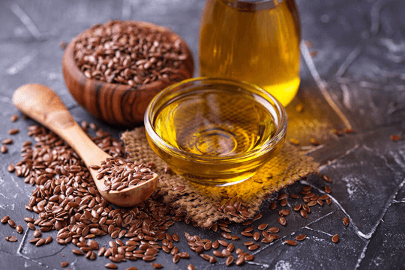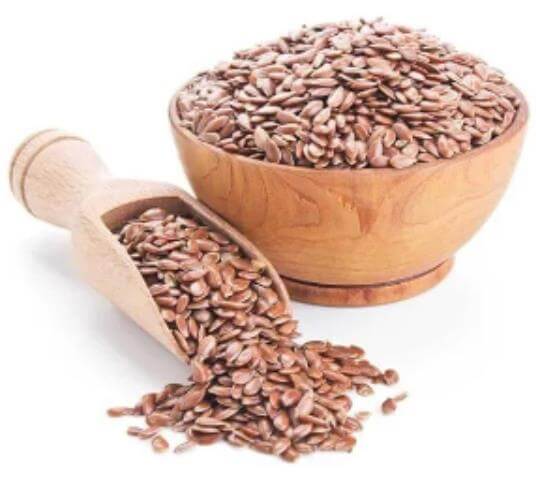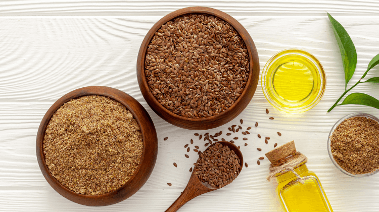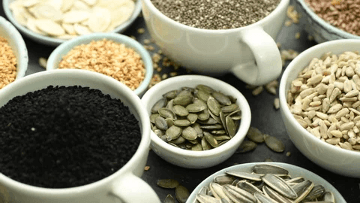Introduction
One of the most common seeds you will find in different meals, including oatmeal bowls, acai bowls, and smoothies, among others, is the flax seed. Thanks to their versatility, flax seeds have been used not only in the food industry but also in the textile industry. These days, however, flax seeds have grown in popularity in the food industry.

More people are becoming increasingly conscious of these seeds’ numerous health benefits, such as
weight loss
, among others. Hence, this article describes flax seeds, where they come from, the many benefits they offer, especially for women, and any side effects.
What are Flax Seeds?
Flax seeds, also called linseeds, are small, golden, or brown-colored seeds that have been used for their medicinal properties for many decades. They contain phytoestrogen, similar to estrogen, oil, and soluble fiber.
Flax seeds are produced by the flax plant, which grows all over Europe, Asia, and the Mediterranean. They are cultivated for their seeds, which are super rich in Omega-3 fatty acids and fiber. Flax seeds are extremely popular for their numerous health benefits; even
experts have called them Superfood
.
Health Benefits of Flax Seeds
These small seeds, packed with loads of nutrients, provide several health benefits for both women and men. However, we will explore research on women’s health benefits, especially their importance for breast health, weight loss, and fertility.
Flax Seeds for Breast Health

Breast cancer is one of the most common types of cancer among women. It accounts for
1 in 8 cancer diagnoses worldwide
. And each year, in the United States, about 264,000 cases of breast cancer are diagnosed in women. This shows how prevalent this medical issue is worldwide.
The good news is studies have shown that flax seeds may have a protective effect against breast cancer due to their high lignan content. Lignans are plant compounds that contain estrogen and have antioxidant properties. Estrogen plays an essential role in the development and progression of cancer.
Flax seeds contain a very large number of these lignans; in fact, according to
research
, it is estimated that the amount of lignans present in flaxseed is about 75 to 800 times higher than in cereals, legumes, fruits, and vegetables.
Lignans have been shown to lower the risk of developing different types of cancer, including breast cancer. A study published in the
Journal of Clinical Oncology
showed that women who consumed the most lignans had a 40% lower risk of developing breast cancer than those who consumed the least lignans.
In addition, another study found that lignans reduce the progression of breast cancer. Flax seeds contain a rich content of omega-3 fatty acids,
which have been found to have anti-inflammatory properties.
Inflammation is crucial to the development and progression of breast cancer, and reducing inflammation may help to reduce the risk of breast cancer.
Flax Seeds for Weight Loss

Obesity has become a significant health concern in our world today. A recent survey by
The World Obesity Federation
estimates that in 2020 around 770 million adults globally were affected by obesity. That figure is anticipated to exceed one billion by 2030 unless we act soon. Also, according to the
World Health Organization
, 39% of adults aged 18 years and over (39% of men and 40% of women) are overweight.
Moreso, obesity is a risk factor for numerous chronic diseases, including type 2 diabetes, cardiovascular disease, and certain types of cancer. Studies have found that including flax seeds in diets may be beneficial for
weight loss and weight management
.
This is because flax seeds reduce appetite and increase feelings of fullness in overweight and obese individuals, and in general, consuming flax seeds reduce the overall calorie intake of the participants. The result of this is that you stop binge eating to satiate your hunger.
If you usually feel the urge to snack between meals or want to reduce your food consumption, flax seeds will make a great addition to your diet, especially in your breakfast. In addition, another research found that adding flax seeds to weight-loss plans may enhance weight loss and reduce inflammation in overweight and obese women.
In fact, the
research
clearly estimated that women who added flax seeds to their weight loss diet lost more weight and significantly reduced inflammation compared to those who did not.
Finally, a team of researchers reviewed 45 studies in 2017, concluding that incorporating whole flaxseed into your diet can significantly reduce
waist circumference, body weight, and body mass index (BMI).
For better action, daily consumption of a tablespoon of flaxseed is recommended. One tablespoon of flax seeds contains approximately 3 grams of fiber or 12%.
Flax Seeds for Fertility

Flax seeds have shown impressive benefits for fertility and reproductive health. Infertility in women is a major health concern. In the United States, for example,
among married women aged 15 to 49 years with no prior births
, about 1 in 5 (19%) are unable to get pregnant after one year of trying (infertility).
Moreso, in this group, about 26% of women have challenges getting pregnant or carrying a pregnancy to term (impaired fecundity). Thanks to the presence of phytoestrogens, flax seeds have been associated with
improved ovulation and menstrual regularity
, which can increase the chances of conception. The lignans have also been shown to have estrogenic properties, which may help regulate hormonal imbalances that can interfere with fertility.
Phytoestrogens are plant compounds that possess estrogenic properties, and they help balance hormone levels in women and, ultimately, improve fertility. In a
study
, researchers found that women who consumed flax seeds had higher levels of sex hormone-binding globulin (SHBG) compared to women who did not consume flax seeds.
Sex hormone-binding globulin (SHBG) is a protein that binds to hormones such as estrogen and testosterone, and
higher levels of SHBG are good for improved fertility
. Furthermore, adding flax seeds to the meals of women undergoing in vitro fertilization (IVF) has been shown to improve the success rate of the procedure.
Finally, Flaxseeds are rich in fiber, which can help reduce estrogen levels in the body by promoting regular bowel movements. High estrogen levels can interfere with ovulation and
decrease pregnancy rates by interrupting the
embryo’s implantation into the endometrium in patients treated with fresh cycles of in vitro fertilization.
Possible Side Effects of Flax Seeds
While flax seeds have many health benefits, especially for women, there are some side effects, and they may not be ideal for everyone. For women experiencing endometriosis or hormonal imbalance, consuming flax seeds is not a good option.
Also, women should avoid flax seeds during pregnancy and breastfeeding. Other common side effects include bloating, gas, constipation, stomach aches, diarrhea, intestinal obstruction, reduced blood clotting ability, and allergies.
Conclusion
Flax seeds are powerful and highly beneficial seeds that should be incorporated into your diet, thanks to the high lignan content that makes them a unique and potentially beneficial addition to your diet. They may help lower cholesterol levels and blood pressure, and reduce the risk of diabetes, among many other impressive health benefits.
However, note that flax seeds are not the absolute solution to all your health challenges. They work better if combined with other medically recommended solutions. And finally, moderation is key.
References
-
Buck, K., Zaineddin, A. K., Vrieling, A., Heinz, J., Linseisen, J., Flesch-Janys, D., & Chang-Claude, J. (2011). Estimated enterolignans, lignan-rich foods, and fiber in relation to survival after postmenopausal breast cancer. British Journal of Cancer, 105(8), 1151-1157.
https://doi.org/10.1038/bjc.2011.374
-
Rodriguez-Leyva, D., Bassett, C. M., McCullough, R., & Pierce, G. N. (2010). The cardiovascular effects of flaxseed and its omega-3 fatty acid, alpha-linolenic acid. The Canadian Journal of Cardiology, 26(9), 489-496.
https://doi.org/10.1016/s0828-282x(10)70455-4
-
Parikh, M., Maddaford, T. G., Austria, J. A., Aliani, M., Netticadan, T., & Pierce, G. N. (2019). Dietary Flaxseed as a Strategy for Improving Human Health. Nutrients, 11(5).
https://doi.org/10.3390/nu11051171
-
Velentzis, L. S., Cantwell, M. M., Cardwell, C., Keshtgar, M. R., Leathem, A. J., & Woodside, J. V. (2009). Lignans and breast cancer risk in pre-and post-menopausal women: Meta-analyses of observational studies. British Journal of Cancer, 100(9), 1492-1498.
https://doi.org/10.1038/sj.bjc.6605003
- Fabian CJ, Kimler BF, Hursting SD. Omega-3 fatty acids for breast cancer prevention and survivorship. Breast Cancer Res. 2015 May 4;17(1):62. doi: 10.1186/s13058-015-0571-6. PMID: 25936773; PMCID: PMC4418048.
-
https://www.worldobesity.org/about/about-obesity/prevalence-of-obesity#:~:text=That%20equates%20to%2039%25%20(39,risk%20to%20health%20than%20underweight)
-
Lara Cassani, R. S., Fassini, P. G., Silvah, J. H., Mártires Lima, C. M., & Marchini, J. S. (2015). Impact of weight loss diet associated with flaxseed on inflammatory markers in men with cardiovascular risk factors: A clinical study.
Nutrition Journal
,
14
.
https://doi.org/10.1186/1475-2891-14-5
-
Skoracka, K., Ratajczak, A. E., Rychter, A. M., Dobrowolska, A., & Krela-Kaźmierczak, I. (2021). Female Fertility and the Nutritional Approach: The Most Essential Aspects. Advances in Nutrition, 12(6), 2372-2386.
https://doi.org/10.1093/advances/nmab068
-
Nowak, D. A., Snyder, D. C., Brown, A. J., & Demark-Wahnefried, W. (2007). The Effect of Flaxseed Supplementation on Hormonal Levels Associated with Polycystic Ovarian Syndrome: A Case Study.
Current topics in nutraceutical research
,
5
(4), 177.
https://www.ncbi.nlm.nih.gov/pmc/articles/PMC2752973/
-
Mehrabian, F., & Afghahi, M. (2013). Can Sex-hormone Binding Globulin Considered as a Predictor of Response to Pharmacological Treatment in Women with Polycystic Ovary Syndrome? International Journal of Preventive Medicine, 4(10), 1169-1174.
https://www.ncbi.nlm.nih.gov/pmc/articles/PMC3843304/
-
Kohil, A., Chouliaras, S., Alabduljabbar, S., Lakshmanan, A. P., Ahmed, S. H., Awwad, J., & Terranegra, A. (2022). Female infertility and diet, is there a role for a personalized nutritional approach in assisted reproductive technologies? A Narrative Review.
Frontiers in Nutrition
,
9
.
https://doi.org/10.3389/fnut.2022.927972

 By myulikeadmin
By myulikeadmin



